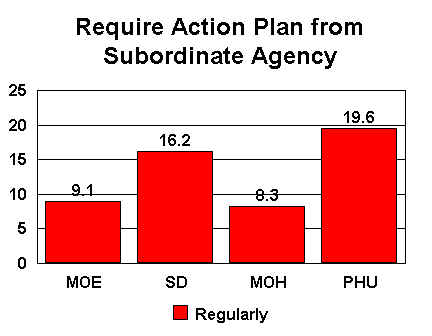
Leadership - Require Policies, Action Plans
8.1.19 Leadership - Require Policies, Action Plans
Ministries in both systems were asked about the requirements they have regarding policies of the local school districts and public health units.
A small minority of education ministries reported that they required school boards to have comprehensive HIV/AIDS/STD/sexuality policies, that they published comprehensive policy guidelines or that they monitored the number and nature of those school district policies. This may indicate that a loosely-coupled nature of both systems exists where, neither school districts, nor public health units are regarded as being directly accountable to implement policies developed by the ministry.
Figure 73
| Encourage Policy In School Districts | Yes |
No |
In Part |
Don’t Know |
| Require SD to have comprehensive HIV policy (MOE-33a) | 9.1 |
72.7 |
18.2 |
0 |
| Publish policy guidelines or models (MOE-33b) | 27.3 |
54.5 |
18.2 |
0 |
| Monitor number, nature of school district HIV policies (MOE-33c) | 0 |
45.5 |
45.5 |
9 |
In a similar question, a majority of health ministries said that they had published comprehensive guidelines and over half said that they monitored the number and nature of public health unit policies related to HIV/STD/sexuality.
Figure 74
| Encourage Policy in Public Health Units | Yes |
No |
In Part |
No Response |
| MOH-12a | 41.7 |
41.7 |
8.3 |
8.3 |
| MOH-12b | 58.3 |
25 |
16.7 |
0 |
Required Action Plans
The table and chart below reports on the responses from both sectors when asked if they required the next level in their systems to have a comprehensive action plan on HIV/ STD/ sexuality. The results indicate that subordinate agencies are not required to have such action plans on HIV/STD/sexuality.
Figure 75
| Requires Action Plan | Planned |
Regularly |
Once in last 3 yrs. |
Once in last 4-10 yrs. |
Never |
Not role |
Don’t Know |
No Response |
| MOE - 21b | 0.0 |
9.1 |
0.0 |
0.0 |
54.5 |
18.2 |
18.2 |
0.0 |
| SD - 22b | 4.4 |
16.2 |
0.3 |
7.5 |
63.7 |
n/a |
6.4 |
1.5 |
| MOH -15d | 0.0 |
8.3 |
8.3 |
0.0 |
25.0 |
33.3 |
25.1 |
0.0 |
| PHU - 11c | 1.1 |
19.6 |
12.7 |
4.6 |
30.0 |
23.6 |
4.5 |
3.9 |
Figure 76

Facilitating Cooperation
Several questions were asked of health and education respondents on how they facilitated cooperation among different ministries, agencies and professionals. Similar or matching questions are reported here in parallel fashion, comparing the different levels of operations within the two systems. The different questions asked of the health system reflected the research-based view that public health is responsible for the interdisciplinary cooperation and facilitation of the coordination of community resources.
Summary of Results Related to Inter-ministry Cooperation
Twenty-four and 36% of respondents from the health and education ministries respectively, reported that there is an inter-ministry protocol that describes how the two ministries will cooperate on HIV prevention and sexual health promotion.
Only about one-third of respondents from both the health and education ministries reported that they have an active inter-ministry committee, either to monitor an interministry plan or to advise on school programs. Less than 25% of education and health ministry respondents reported that there was an active inter-ministry cooperation or that they had assigned staff time to help in the inter- ministry cooperation.
A minority of health ministries reported that they had a policy framework to encourage cooperation.
Two-thirds of health ministries reported that they disseminated information to the other ministry. About one-half of education ministries reported that they had a process to pass such information along in their ministry.
Education ministries did not encourage school districts to cooperate with universities about HIV/sexuality. One-half of health ministries reported that they encouraged public health units to cooperate with universities regarding HIV/sexual health.
About one-third of health ministries regularly encourage cooperation with private foundations on HIV/sexual health.